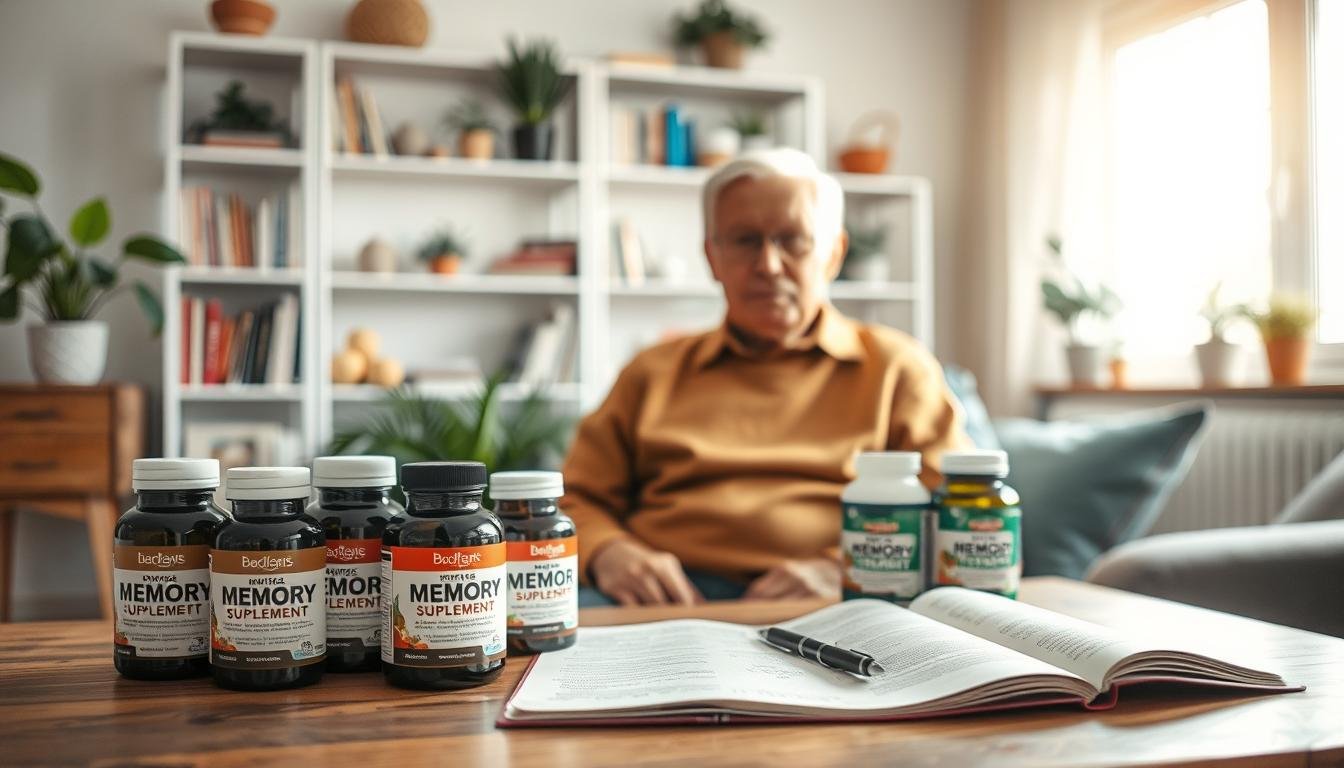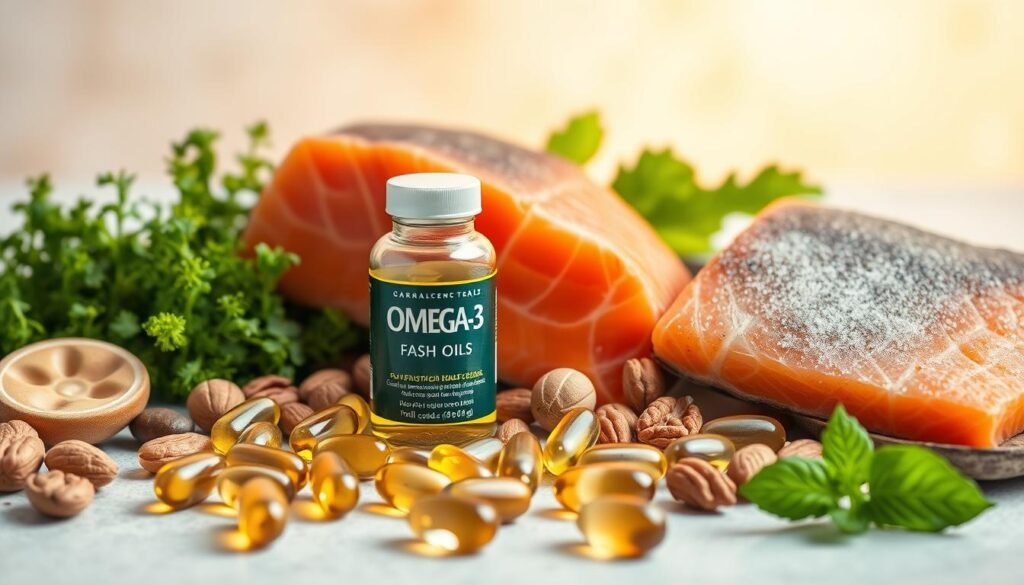
Did you know that up to 20% of older adults aged 85 and above may face cognitive impairment? As our senior population grows, reaching 20% by 2050, keeping brain health in focus is more important than ever. Memory supplements, made of vitamins, minerals, and herbs, could help seniors keep their minds sharp.
The market for brain supplements is growing fast, expected to hit $5.8 billion by 2023. Yet, there’s a lot of debate about their regulation and how well they work. This guide aims to help you find the best memory supplements for seniors, ensuring you make smart choices for your brain health.
Key Takeaways
- Seniors aged 85 and older face a significantly higher risk of cognitive impairment, up to 20%.
- Memory supplements might help seniors maintain or improve brain function.
- The brain-health supplement market is anticipated to reach $5.8 billion by 2023.
- Despite their popularity, there’s much debate on the effectiveness and regulation of these supplements.
- Understanding the right blend of natural ingredients is critical for enhancing cognitive functions.
The Importance of Brain Health for Seniors
As we age, keeping our brains healthy is key to feeling good. It’s important to know how brain health changes and the risks. This helps seniors and their caregivers choose the right supplements and make lifestyle changes.

Understanding Cognitive Decline in Aging
As we get older, our brains change, sometimes leading to mild cognitive impairment or Alzheimer’s. About 23.4% of seniors face mild cognitive impairment, a step towards dementia. High blood pressure in middle age can raise the risk of brain decline later.
Studies show that lowering blood pressure to under 120 mmHg for those over 50 can help. Eating the Mediterranean or MIND diet can also lower dementia risk. Taking a daily multivitamin can improve memory and thinking in older adults, slowing brain decline by two years.
Doing activities like quilting, photography, music, and theater also boosts memory and self-esteem.
Risks Associated with Cognitive Impairment
Dementia risks grow with health issues like Alzheimer’s, diabetes, and heart disease. Sleep disorders and depression also play a part. Studies link high blood pressure and heart disease to worse brain health.
Experts say we should do at least 150 minutes of physical activity weekly for brain health. Training in reasoning and speed can also slow down brain decline.
Social activities and community programs help keep our brains sharp. A big study with over 5,000 seniors showed that taking Centrum Silver Adults 50+ multivitamins delayed brain decline by two years. This highlights the role of brain supplements in aging.
Natural Ingredients That Boost Cognitive Function
Are you looking to improve your brain power naturally? It’s key to know about natural cognitive boosters. Many ingredients, like herbal remedies and antioxidants, can greatly help your memory and brain health. Let’s explore some top natural ingredients and how they help your brain.
Beneficial Herbs and Their Effects
Herbal remedies are known for boosting brain function. Herbs like ginkgo biloba and ginseng are leaders in this area. Ginkgo biloba, for example, can improve memory and focus, especially for older adults.
Ginseng also boosts brain function but should be used carefully due to its interactions with medicines and possible side effects. Gotu Kola is another herb that may improve mental clarity, but it can rarely cause liver damage.
The Role of Antioxidants
Antioxidants are key in protecting the brain from damage. They are a big part of natural cognitive boosters. Eating foods rich in antioxidants, like berries, nuts, and dark chocolate, can slow down brain aging.
It’s also important to avoid foods high in refined carbs, as they can harm memory. A study with over 4,000 participants showed that too much sugar can lead to smaller brain size and worse memory.

Exploring Nutritional Sources
Eating brain health foods is a great way to support your brain. Omega-3 fatty acids in fish oil, for example, can improve memory, especially for those with mild memory loss. Studies show that EPA and DHA, two omega-3s, greatly help adult memory.
Also, eating lots of fruits and veggies can make your brain healthier. The Mediterranean diet, rich in omega-3s, has been shown to lower dementia risk. This shows how important a balanced diet is for your brain.
The Benefits of Omega-3 Fatty Acids for Memory
Omega-3 fatty acids are getting a lot of attention for their role in improving memory and brain health. These fats, mainly found in fish oil, have been shown to help with thinking and memory, especially for older people.

Sources of Omega-3s
Many foods are rich in omega-3s, like fatty fish like salmon, mackerel, and sardines. Flaxseeds, chia seeds, and walnuts are good sources for those who don’t eat enough fish. If it’s hard to get enough from food, supplements can help.
| Source | Type of Omega-3 |
|---|---|
| Salmon | EPA, DHA |
| Flaxseeds | ALA |
| Chia Seeds | ALA |
| Fish Oil Supplements | EPA, DHA |
How Omega-3s Support Brain Health
Omega-3 fatty acids are key for keeping our brains sharp. Studies show they help improve memory and brain health in several ways:
- Improved Cognitive Function: Older adults who took 900 mg of DHA daily for 24 weeks saw better learning and memory.
- Support Against Cognitive Impairment: Taking 1.8 grams of omega-3s daily for 24 weeks helped those with mild cognitive impairment (MCI).
- Depression Management: Omega-3 supplements can help with depression, offering benefits similar to antidepressants, especially with more EPA.
The US FDA says it’s safe to take up to 3,000 mg of omega-3 supplements daily. Adding omega-3s to your diet, through food or supplements, is a smart choice for seniors wanting to keep their brains healthy and sharp.
Memory Supplements for Seniors Brain Health
Seniors are looking for ways to improve their brain function. They are turning to memory supplements like omega-3 pills and herbal blends. These supplements aim to boost cognitive performance and slow down cognitive decline.
A 2022 study found that omega-3 fatty acids can improve learning, memory, and brain function. They also increase blood flow to the brain.
A 2023 study showed that multivitamins can help improve memory in older adults. A 2024 study also found that multivitamins can aid in memory improvement. However, vitamins B12, D, and E have limited evidence for this benefit.
Ingredients like ashwagandha, phosphatidylserine, and Lion’s Mane have strong evidence for supporting memory. Vitamins B6, B9, and carnitine have limited evidence. Ginkgo biloba, coffee extracts, and L-theanine show little to no evidence of supporting memory.
The FDA doesn’t monitor supplements like medications. This makes it crucial for consumers to research supplement ingredients. Diets like the Mediterranean, MIND, and DASH diets can reduce Alzheimer’s disease and improve memory. Exercise also benefits those with Alzheimer’s, enhancing memory and cognitive function.
Cognitive supplements can be beneficial for seniors. However, it’s important to talk to healthcare professionals before adding new supplements to your diet. Combining healthy lifestyle choices like diet, exercise, sleep, social connections, and mental stimulation is key for brain health.
| Supplement | Evidence | Benefits |
|---|---|---|
| Omega-3 Fatty Acids | Strong | Improves learning, memory, cognitive function, increases blood flow to the brain. |
| Multivitamins | Moderate | Aid memory improvement in older adults. |
| Ashwagandha | Robust | Supports memory and reduces cognitive decline. |
| Ginkgo Biloba | Limited | Potential for enhancing focus and memory. |
| Turmeric (Curcumin) | Moderate | May improve memory in individuals with mild memory complaints. |
The Role of Ginkgo Biloba in Enhancing Focus
In recent years, ginkgo biloba has become popular, especially among seniors. They use it to improve focus and cognitive function. It’s crucial to look into both the benefits and risks before adding it to your routine.
How Ginkgo Biloba Works
Ginkgo biloba comes from an ancient tree and has strong antioxidants. These are called ginkgo flavonoids and terpene lactones. They help improve blood flow to the brain, which can enhance focus and memory.
Studies have shown that ginkgo biloba can help with memory. For example, a study on mice showed that it improved memory at certain doses. It also protects the brain by making brain cells stronger.
| Study | Findings |
|---|---|
| GuidAge Trial | No significant effect in preventing dementia with long-term ginkgo usage. |
| Ginkgo Evaluation of Memory | No substantial improvement in cognitive domains such as vigilance, attentiveness, and memory. |
| Mouse Model (5×FAD) | EGb 761 at higher doses improved memory deficits and increased neurogenesis. |
Potential Interactions and Side Effects
While ginkgo biloba seems promising, it’s important to be cautious. It can interact with blood thinners and increase bleeding risk. It’s wise to talk to a healthcare professional before starting it, especially if you’re a senior.
Knowing how ginkgo biloba works is key to making smart health choices. Always weigh its benefits against the risks to keep your health in check.
How Phosphatidylserine Supports Brain Health
Phosphatidylserine is a fatty substance found in the brain. It helps with cell signaling and keeps cells healthy. This is key for brain health and thinking clearly.
As we age, phosphatidylserine levels drop. This can cause memory loss and lower thinking skills. But, taking supplements can help. They improve memory, mood, and focus.
Studies on animals show that phosphatidylserine levels decrease with age. This means we need to get it from food or supplements. Foods like soybeans and fatty fish are good sources. Supplements like Neuriva are also popular for brain health.
Research shows phosphatidylserine is safe and works well for older adults. A study found that it helped with memory when taken with omega-3s. The right dose varies, so always talk to a doctor first.
But, there can be side effects like stomach problems and trouble sleeping at high doses. The quality of supplements also varies. This makes it hard to know the best dose.
So, phosphatidylserine is good for the brain, but use supplements wisely. Choose high-quality products and get advice from a healthcare professional.
The Impact of Vitamin B12 on Mental Clarity
Vitamin B12 is key for keeping our minds sharp, especially as we age. As we get older, our bodies absorb less of it. So, it’s important to get enough Vitamin B12 from food or supplements.
Importance of Vitamin B12 for Seniors
Seniors often find it harder to absorb Vitamin B12. This can lead to a higher chance of deficiency. For those over 60, about 5-6% have a Vitamin B12 deficiency.
Even if Vitamin B12 doesn’t boost brain function on its own, getting enough is still crucial. It helps keep the mind clear and healthy.
Natural Sources vs. Supplements
You can find Vitamin B12 in foods like meat, dairy, and some cereals. For seniors who have trouble absorbing it, supplements can be a good choice.
Many seniors take Vitamin B12 supplements, even if their levels are normal. This helps prevent deficiency and its effects on the mind.
In Ontario, over 2.9 million tests for Vitamin B12 were done in 2010/2011. This cost about $40 million. It shows how important it is to manage Vitamin B12 levels in seniors. Finding the right balance between food and supplements is key for mental health.
Where to Shop
Finding the best memory supplements for seniors is easy when shopping on Amazon. With a vast selection of trusted brands, competitive prices, and verified customer reviews, Amazon provides a convenient and reliable way to explore brain health solutions. Whether you’re looking for herbal remedies, omega-3 supplements, or nootropic blends, you can find detailed product descriptions and fast shipping options to suit your needs.
Conclusion
We’ve looked deeply into memory supplements for seniors. It’s clear that a mix of diet, lifestyle, and supplements is key for brain health. Seniors can boost their brain function and enjoy a better life.
A study by Dr. Adam M. Brickman of Columbia University found daily multivitamins help. Over 3,500 seniors aged 60 and up took part. They showed better memory skills, especially those with heart disease.
Another study by the NIH involved over 2,200 seniors aged 65 and older. It found multivitamins improve cognitive function. This shows multivitamins are good for the brain.
The COSMOS trial and other studies suggest multivitamins slow brain aging. This is great news for keeping the brain healthy as we age. With dementia on the rise, using these tips can make a big difference.
We need more research on how nutrients protect memory. It’s important to work with doctors to create personalized brain health plans. This way, seniors can keep their minds sharp and enjoy life more.
FAQ
What are some of the best memory supplements for seniors?
How important is brain health for seniors?
What natural ingredients help boost cognitive function?
What are the benefits of Omega-3 fatty acids for memory?
How does Ginkgo Biloba enhance focus?
How does Phosphatidylserine support brain health?
What is the impact of Vitamin B12 on mental clarity?
What is the role of antioxidants in brain health?
Are there any risks associated with using memory supplements?
Source Links
- https://pmc.ncbi.nlm.nih.gov/articles/PMC3311304/
- https://www.aarp.org/health/drugs-supplements/info-2019/brain-supplements-survey.html
- https://www.nia.nih.gov/health/brain-health/cognitive-health-and-older-adults
The Baffls Team (info@baffls.com)
Explore Your World with BAFFLS: Your Ultimate Day Companion!
Disclosure: This post contains affiliate links. If you make a purchase through these links, I may earn a commission at no additional cost to you. We only recommend products or services that I personally use and believe will add value to my audience. Your support helps keep this content free for everyone. Thank you for your support!
Prices and discounts noted at the time of publication Friday January 3, 2025. They may have been changed without notice by the retailer at the time you view this page.








